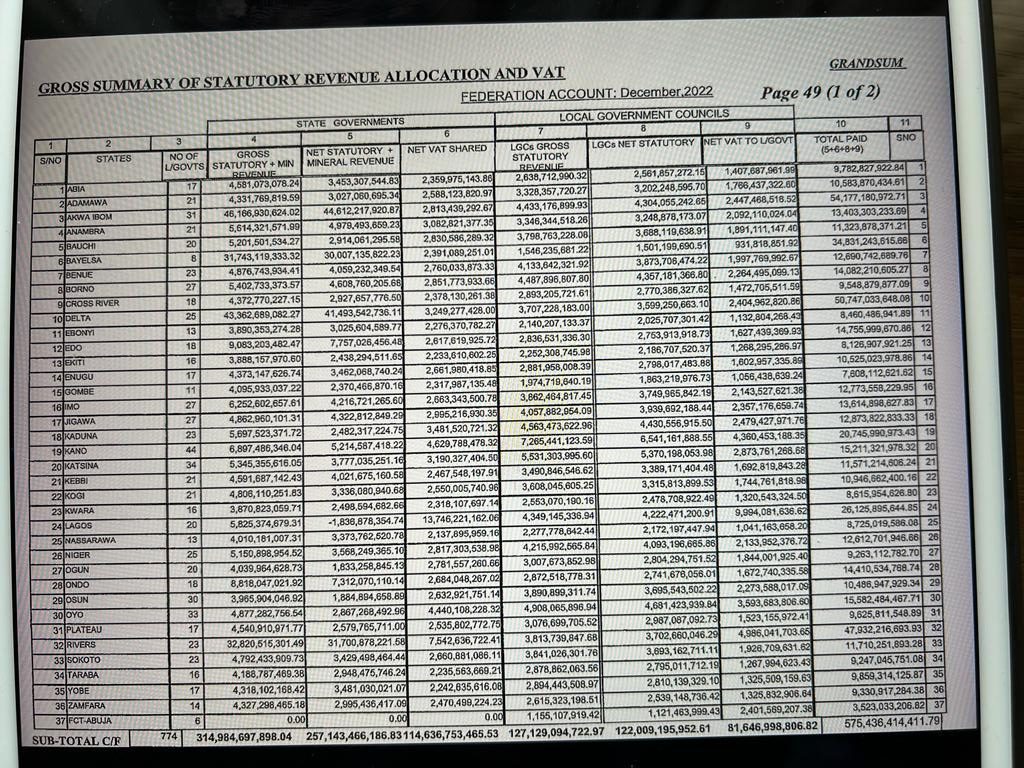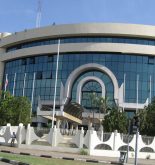Jumbo receipts
In the face of rising debt, the three oil-producing states of Akwa Ibom, Delta, and Rivers received more than N152 billion in revenue out of the N575 billion shared among the 36 states and the Federal Capital Territory (FCT).
According to the Federation Accounts Allocation Committee (FAAC) report for January, the funds include statutory revenue, mineral revenue and Value Added Tax (VAT) revenue shared among the states, the FCT and 774 local government areas in the country.
Akwa Ibom with 31 LGAs led the pack with a total receipt of N54.2 billion, followed by Delta with 25 LGAs got a total of N50.7 billion, and Rivers with 23 LGAs received N47.9 billion, coming third.
Bayela with its eight LGAs got N34.8 billion at the fourth position, followed by Lagos with its 20 LGAs got N26.1 billion at the fifth position and Kano with its 44 LGAs got N20.7 billion in the sixth position.
Oyo State with 33 LGAs got N15.6 billion while Katsina with 34 LGAs got N15.2 billion and Edo with 18 LGAs got N14.7 billion.

Outrageous debt stock
The 36 states and the FCT’s domestic debt outlook is getting worse and very unsustainable, despite the significant improvement in the revenue available to them.
According to Nigeria’s Debt Management Office (DMO), the country’s total domestic debt stocks for the states and the FCT had increased to N5.36 trillion by September 2022, representing an increase of N128.44 billion from the previous quarter’s N5.28 trillion.
Additionally, from September 2021 to September of last year, the states’ domestic debts increased by N1.16 trillion. Meanwhile, during the period under review, Nigeria’s total public debt stock hit a record high, amounting to $103.31 billion.
Domestic debts accounted for 61percent (or $63.25 billion) of total debt, while external debts accounted for 39percent of total of the debt stock.
Surprisingly, total debt stock rose by $16.74 billion in the previous year.
Delta, Oyo, and Abuja recorded the highest year-on-year increase in terms of percentage growth, while Lagos, Delta, and Ogun State recorded the highest increase in terms of actual value.
Nigerian states with the most debts
| Rank | State | Debt (Naira) |
|---|---|---|
| 1. | Lagos | 877,035,995,031.70 |
| 2. | Delta | 272,612,510,528.95 |
| 3. | Ogun | 241,782,021,304.96 |
| 4. | Rivers | 225,505,011,356.00 |
| 5. | Akwa Ibom | 219,617,660,991.63 |
| 6 | Imo | 207,520,959,471.52 |
| 7. | Cross River | 175,198,799,155.96 |
| 8. | Oyo | 160,071,143,937.27 |
| 9. | Plateau | 151,903,415,543.09 |
| 10. | Bayelsa | 151,158,248,963.07 |
As of 2015, the states and the FCT held a total of N3.03 trillion in domestic debts but by the second quarter of 2022, their collective debt stock has reached a whooping N5.28 trillion and still rising.
The Nigerian Debt Management Office (DMO), in its latest report indicates that Lagos State has the highest domestic debt stock of N797 billion, accounting for 15 per cent of the total sub-national domestic debt.
Delta which is still borrowing is the second most indebted Nigerian state with N379 billion, and Ogun State with N241.98 billion as of June 2022.
On the other hand, Jigawa, Ebonyi, and Kebbi states have the least domestic debt stock in the country.
What makes matters worse is that a large chunk of the debts incurred for future generations of Nigerians are spent on projects with little or no return on investment.
It is also true that some of the funds are being stollen by politicians who have neglected to pay workers’ salary and arrears which extend back several months as well as retired civil servants’ pensions, gratuities.




